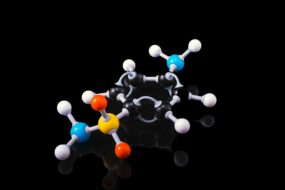
Methotrexate is a dihydrofolate reductase inhibitor with prominent immunosuppressant and anti-inflammatory properties. It is now the DMARD of first choice and the standard treatment for most patients, including cases of juvenile rheumatoid arthritis.
Mechanism of action.
It inhibits;
· Dihydrofolic acid reductase.
· Purine and thymidylic acid synthesis.
This will, in turn, interfere with DNA synthesis, repair, and cellular replication and also cell cycle-specific for the S phase of the cycle.
It also inhibits :
· Rapid proliferation of epithelial cells in the skin.
- Cytokine production.
- Chemotaxis and cell-mediated immune reaction.
Clinical uses.
- Management of severe, active rheumatoid arthritis in adults who have had an insufficient response or are intolerant to NSAIDs.
- It is used in adult and pediatric patients with acute lymphoblastic leukemia (ALL) as part of a combination in chemotherapy regimen.
- Prophylaxis and the treatment of meningeal leukemia in adult and pediatric patients.
- For symptomatic control of severe, recalcitrant, disabling psoriasis in adult patients.
Other indication:
- Breast cancer.
- Gestational trophoblastic neoplasia.
Adverse effects.
- Progressive liver damage leads to liver cirrhosis.
- Oral ulceration and g.i.t upset.
- Increased incidences of chest infections.
- Arachnoiditis in cases of intrathecal administration.
· Reddening of skin, hyperuricemia, and Ulcerative stomatitis.
· Glossitis, gingivitis, and anorexia.
Drug interactions.
- Probenecid and aspirin increase the drug levels and toxicity.
- Concurrent administration of trimethoprim and methotrexate can add to the inhibition of dihydrofolate reductase and depress the bone marrow.
Contraindication.
- Pregnancy
- Breast-feeding.
- Liver and renal disease
- Active infection
- Leucopenia
- Peptic ulcer.
Dosage.
- NEOTREXATE, BIOTREXATE 25mg/ml injectable solution.












